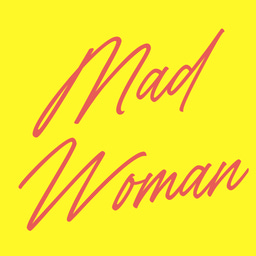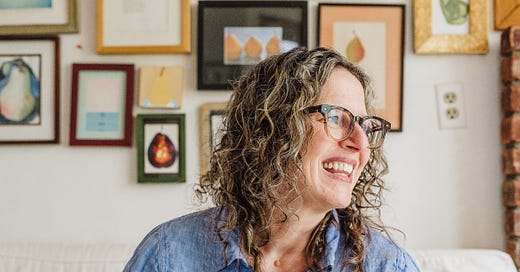
Discover more from Write More, Be Less Careful
"I think the creative brain and the caring brain are essentially the same"
a good creatures interview with TOUCHED OUT author Amanda Montei on caregiving and creativity and creating new narratives around mothering and art-making
Hello there! This is an entry in a new section, good creatures, that explores the intersection of caregiving and creative practice. I’m so excited to showcase people doing lots of kinds of caregiving—people caring for kids or pets or other family members and/or caring for space through gardening or community work or activism—and lots of kinds of creative work.
If you know (or are!) a good creature whose work we should feature, send me an email—you can just reply to this newsletter.
Today’s interview is with
, whose work on mothering and misogyny and #MeToo and more I really love. I met her initially through Substack, when I began reading her excellent newsletter Mad Woman, where she writes about believing women, being a pool mom, the reality of vacation with kids, rethinking ambition, and more, to call out just a few favorite pieces. (When The Long Devotion was published in spring 2022, my co-editor and I talked with Amanda for Mad Woman.)If you’re reading like this, and you’re like, Amanda sounds familiar, it’s probably because she’s truly everywhere right now! She’s had great pieces recently in Time and Elle and The New York Times (!!!), and she just had a really smart interview with
over at Sara’s newsletter, In Pursuit of Clean Countertops. Amanda’s new book, Touched Out: Motherhood, Misogyny, Consent & Control, is out this week.Below, we talk about trying to embrace interruption, the connection between the creative and caregiving brains, and the way that motherhood and mothering narratives are still (still) seen as outside the domain of serious literature. (And I’m giving away a copy, so read to the end for how you can win!)
Who do you care for?
I care for myself, my two kids, ages 8 and 5, and as of a few weeks ago, a 1 year-old dog named Cornbread, who is nearly as much work as a newborn, please send help. I care for extended family, my kids’ friends, my mother. I care for my community, too, especially in my work as a teacher of writing. I tend to care perhaps too much about my students.
What kind of creative work do you do?
I parent. I write. I think of these forms of work as really one in the same. Both require that we renegotiate the archive and create new narratives.
As a writer, though I’ve primarily been writing nonfiction lately, I’m trained in narrative and in poetry. Nonfiction, or the nonfiction I like at least, is perhaps the confluence of these genres, in that it requires both an awareness of the cultural stories we tell, and a kind of poetic logic. I’m also interested in my creative work in resisting the separation between the body and theory, and introducing the personal, the subjective “I,” is one way in which I resist that masculine separation of intellect and sensation.
What is difficult about being creative and a caregiver?
I think the practicalities of what’s hard about being a mother and a writer have been well documented. Maybe what’s most hard is resolving the idea of who and what we imagine a writer should be, with who and what we believe a mother should be. Noting here that I said “should” twice. The more my own work as a parent enters my writing, the more I notice just how trivialized such writing is in literary and academic spheres.
I think there’s also an immediate assumption that writing about the maternal isn’t literary, and that literary texts and practices can’t be maternal either. When mothers write of their own monstrosity, that’s perhaps more attractive, because it confirms the cultural tendency to see women as both mythical and chaotic. It’s also more literary, I suppose, because we’ve long understood genius as inseparable from madness. Mothers can be real writers perhaps only when they are mad; but mad women can’t be good mothers. Where does that leave us?
What’s an adjustment you’ve had to make to your creative process, and an adjustment you refuse to make?
When I work with writers who are also parents, I’m super keen on encouraging them to embrace interruption. I love the idea of refusing to create texts that could only be made by the model male writer, sitting alone, unbothered by children or domestic duties. If I’m honest, however, I refuse to write with interruptions! It’s very hard for me to create meaningful work when I can’t concentrate. In part, this is probably related to attention and sensory stuff, but I think it’s also a testament to how my training as a writer and an academic had been so rooted in that belief that solitary confinement is the ultimate creative zone. It’s hard to unlearn that training. It’s perhaps become part of my physiology now.
What do you do to help activate the switch (if it is a switch) between creative-brain and care-giving brain? (Is it possible to switch?)
I think the creative brain and the caring brain are essentially the same. Certainly there is an aspect of writing that requires my editorial brain, a more critical and logical voice, maybe the voice I slip into when I am inadvertently trying to correct or control my kids at bedtime. But when I’m speaking with my children about the world, really connecting with them about their experiences, or others’ experiences, or questions that they have about living, there’s a process of both interpretation and authorship always at work. The difference, I suppose, is that in caregiving, the work is being done in community, across bodies, and so if there is a switch or a lever I need to pull when I move from writing to parenting, it’s the one that reminds me that I’m not alone in this thing. But I also hate to be interrupted when I’m parenting!
Amanda Montei is the author, most recently, of Touched Out: Motherhood, Misogyny, Consent & Control. You can get a signed copy from Skylight Books, or order it from Bookshop, your favorite local bookstore, or anywhere else you like to buy books. She’s on instagram as @amontei Twitter (I mean X!): @AmandaMontei
Amanda’s doing a ton of great book events this fall, and you can catch her on the west coast, east coast, and virtually. (I’m hoping to catch her with Minna Dubin, Lisa Lim, and Deesha Philyaw at the Brooklyn Book Festival at the end of September. Anyone else planning on going?) Info about all of Amanda’s book events is here!
You can read more at her website and at her great newsletter, Mad Woman.
You definitely want to read Amanda’s book now, right? I have a copy to give away, and I would love to send it to you. I think Touched Out is going to change a lot of minds, or at least show a lot of us that we’re not alone.
In that spirit, comment below with the name of a book that changed how you think about something, or how you saw something, and you’ll be entered in the giveaway. (I’ll pick a winner Sunday evening using a random number generator, so get your answer in by then!)
Write More, Be Less Careful is a newsletter about why writing is hard & how to do it anyway. You can find my books here and read other recent writing here. If you’d like occasional dog photos, glimpses of my walks around town, and writing process snapshots, find me on instagram.
If Write More has helped you in your creative life, I’d love it if you would share it with a friend.





















LOVE this take on the caring and creative brain as one. Never thought of it exactly like that, but I feel that. Caregiving is a full-on sensory presence. Imagining a whole new perspective of another person and then reimagining it as they keep changing and growing. Endlessly thinking about the what-ifs and possibilities. It explains why both aspects — caring and creativity — foster growth and connection.
I love this idea for a series, I had something similar on my old blog, just because it felt like such a struggle to parent and also be creative. My main frustration was always that inspiration would strike and that I wouldn't be able to act on it bc of caretaking duties. Looking forward to reading Amanda's book!